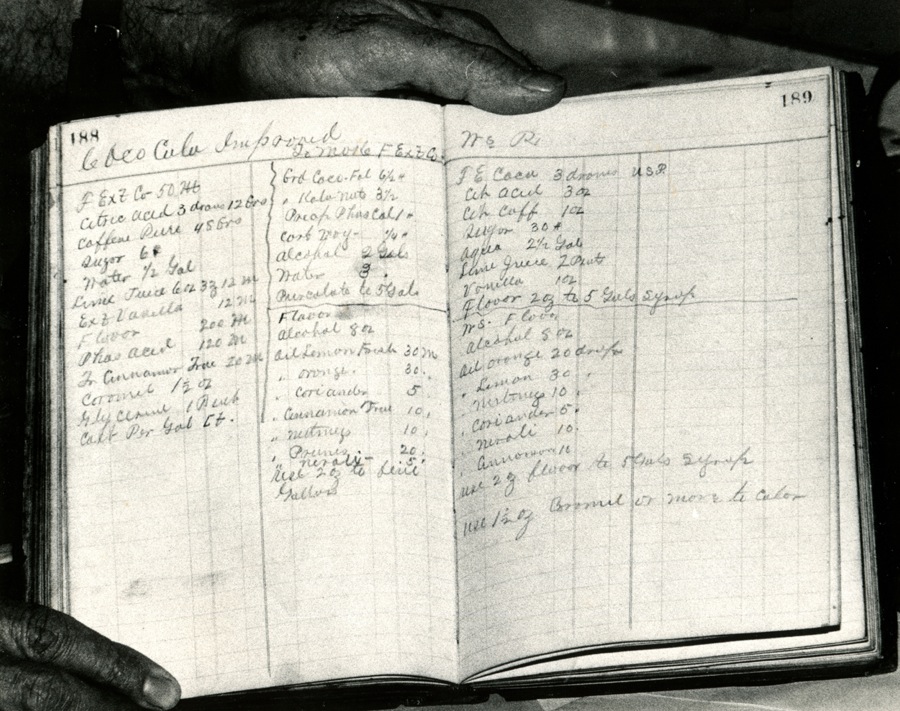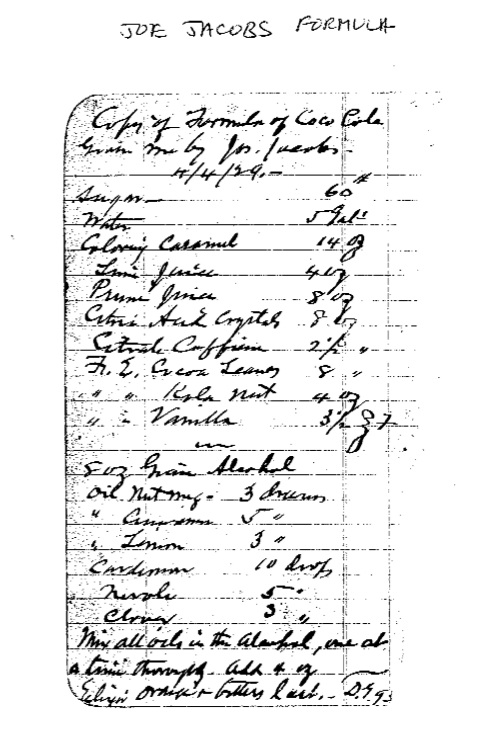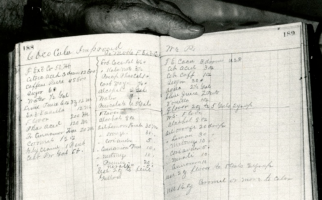The Recipe
Related Episode

Here is the cola recipe referenced in our episode Original Recipe. All of these ingredients can be bought online. Instructions follow the ingredient list. If you do make a batch, email us at [email protected] to let us know how it turned out (and send photos!).
Related Episodes
| Everett Beal's Recipe Book In Feb 28, 1979 Article Atlanta Journal and Constitution Newspaper |
Pemberton's Notebook Published in the 1992 History: For God, Country & Coca-Cola |
|
| FE Coca (Fluid Extract of Coca) |
3 drams USP | 4 oz FE Coco |
| Citric Acid | 3 oz | 3 oz |
| Caffeine | 1 oz | 1oz Citrate Caffein |
| Sugar | 30 # | 30 # |
| Water | 2.5 gal | 2.5 gal |
| Lime Juice | 2 pints (1 qrt) | 1 qrt |
| Vanilla | 1 oz | 1 oz |
| Caramel | 1.5 oz or more to color | Color sufficient |
| Use 2 oz flavor (below) to 5 gals syrup | 2.5 oz flavor | |
| 7X Flavor | ||
| Alcohol | 8 oz | 1 qrt |
| Orange Oil | 20 drops | 80 |
| Lemon Oil | 30 | 120 |
| Nutmeg Oil | 10 | 40 |
| Corriander Oil | 5 | 20 |
| Neroli Oil | 10 | 40 |
| Cinnamon Oil | 10 | 40 |
| (The Pemberton formula for 7X is the same as the Beal, just four times as much.) | ||
How to Make This Recipe
As we said in the radio story, this recipe includes two parts. The recipe for the syrup, and the recipe for the 7X flavoring formula. You can scale down the recipe for the syrup if you don't want to make gallons of the syrup. You will need one ounce of syrup mixed with 5 ounces of carbonated water to make a serving of soda.
When you buy your ingredients be careful that you buy FOOD GRADE. There are lots of things you can find on the Internet that can be used in this recipe that are not food grade and will make you sick.
And before you start, you may want to read these helpful tips sent in by a listener in Chicago.
1) Make the 7X flavor. To make this, you'll want food grade essential oils at 100 percent strength. They can be found by searching for food grade essential oils in the grocery section of Amazon.com and other places (this orange oil, for instance).
For a home recipe, you can get an eyedropper and count drops the old-fashioned way, but if you want to be more precise, Steve Warth at Sovereign Flavors says he estimated each drop was .025 grams, which means you want 0.5 grams of Orange Oil, 0.75 of Lemon Oil, 0.25 grams of Nutmeg Oil, 0.125 grams of Coriander Oil, 0.25 grams of Neroli Oil, 0.25 grams of Cinnamon Oil (historian Mark Pendergrast says the original Coke recipe was made with a kind of cinnamon called Cassia).
Combine those with 8 ounces of food grade alcohol. This ingredient, we'll be frank, will be kind of a pain in the ass to find. Important: Do NOT use Ethyl Rubbing Alcohol or Rubbing Alcohol or Denatured Ethyl Alcohol. These will make you sick. You need food grade ethyl alcohol. Sometimes people swap Everclear or other neutral grain spirits for this, and our beverage guys suggest this as an easy, cheap substitute.
2) Make your fluid extract of coca. Buy whole leaf coca tea. Instructions for making coca extract from this can be found online. You don't need much. The recipe calls for 3 fluid drams, which is equivalent to 1/8 of a fluid ounce or – an easier measurement for a home kitchen – 3/4 of a tablespoon.
3) Make the syrup. Once you have your 7X flavor, and your fluid extract of coca, you are ready to mix them with your other ingredients to make the syrup. Mix your ingredients in this order: water, sugar, then coloring, then coca extract, then vanilla extract, then caffeine, then lime juice and citric acid.
Several Notes:
-- If you do not want to make several gallons of the syrup, you can adjust the recipe by reducing all ingredients by the same rate -- one half the original amount, one quarter, and so on.
-- Another important thing about this step, as we said in the radio story about the recipe, the Sovereign Flavors chemists concluded that in order to compensate for the intensity of contemporary essential oils (125 years of advances in food technology means it's possible that they're much stronger than the oils Pemberton used in his lab in 1886) the 7X flavoring addition should be reduced by 75 percent. That means, if you make the full size batch, you should only use 1/2 ounce of 7X formula instead of the 2 ounces specified in the original recipe.
-- You might want to cut down on the caffeine. We all got a strong buzz from the soda we made with the recipe, and then one of the beverage professionals pointed out that it was because it had five times the amount of caffeine of a modern soda.
-- Some ingredients are measured in fluid ounces, others are measured in ounces by weight. The team at Sovereign Flavors says if an ingredient is liquid -- coca extract or vanilla extract -- it should be measured in fluid ounces. If it's a dry ingredient, like citric acid, it should be measured by weight.
4) Make the soda. Once you have mixed the syrup, it should be combined with carbonated water at a ratio of 1-to-5 (one part syrup to five parts bubbly water) to make the soda.
Legal language we have to include here: If you're making this soda, it's entirely at your own risk. The soda companies and radio stations involved in this story make no claims about the safety of this old recipe.
Here's the press release we put out about this story.
This episode of our show kicked off a wave of international press coverage that, inevitably, included inaccuracies.
To be clear: We are not claiming that we have found the recipe used today for Coca-Cola. We believe we found a recipe that is either the original recipe made by the inventor of Coke, John Pemberton, or a version of Coca-Cola that he made either before or after the product hit the market in 1886. We believe that because it was found in the notebook of his friend, on a page entitled "Coco-Cola recipe improved," and because it was found in Pemberton's own notebook, in Coca-Cola's archives.
Much of the press about our story takes at face value Coca-Cola's statements that we have not found the recipe for Coke, present or past. But when asked if the company has actually checked to see if this formula matches the original formula - which archivist Phil Mooney assured me they still have - company spokespeople always politely sidestep the question. So it seems entirely possible that no one at Coke has checked. If they'd checked to see if the formulas match, why not say so?
Phil Mooney even admitted something interesting about the recipe in our interview: "Could it be a precursor? Yeah, absolutely." He then went on to express, as his opinion, not as fact: "Is this the one that went to market? I don't think so."
Since the original formula is no longer made by Coke, and since all the ingredients seem to be on the public record, why not release the old formula? This year, Coke's 125th anniversary, would be a great time for it!
So we stand by our story. We believe the recipe is either the version Pemberton brought to market in 1886, a precursor, or an improved version made after it was already on the market. As for our bigger point, that the ingredients to Coke's supposedly super-secret formula can be figured out without much trouble by anyone who wants to, that seems incontrovertibly true. Versions of the recipe have been published starting in the 1960's. Not to mention that a device called a gas chromatograph can tell a trained scientist the ingredients in coke or any other beverage, not with perfect accuracy, but close enough that you're in the ballpark.
Here are more photos:

Joe Jacobs's recipe comes from The Coca-Cola Company's archives, sent to us by Coke's archivist Phil Mooney after our interview. Mooney says Coke has been sent dozens of these recipes over the years and he told us he thinks they're usually the work of people trying to imitate Coke, not versions of the real original recipe. This one originally came from Joe Jacobs, owner of the drug store where Coca-Cola was first served. Many of the ingredients are the same as the recipe in the 1979 newspaper but there are a few differences. Mooney says this is typical. This one has prune juice and clover and the caffeine comes from kola nut.

Another recipe from The Coca-Cola Company archives, sent to us by Phil Mooney. This one's a 1969 letter sent to Coca-Cola by a man in Mississippi named John Whitten, who believed he had found the original recipe for Coke.

Whitten's recipe, which is quite close to the one in the notebook shown in the Atlanta newspaper photo.

Some of the thousands of flavorings in the lab at Sovereign Flavors in Santa Ana, CA.

Soda at our first taste test in the conference room at Jones Soda in Seattle.

Host Ira Glass and producer Ben Calhoun, at Fairway Market to administer the taste test.

Another man ponders the taste of our cola.

Another taste test participant.


